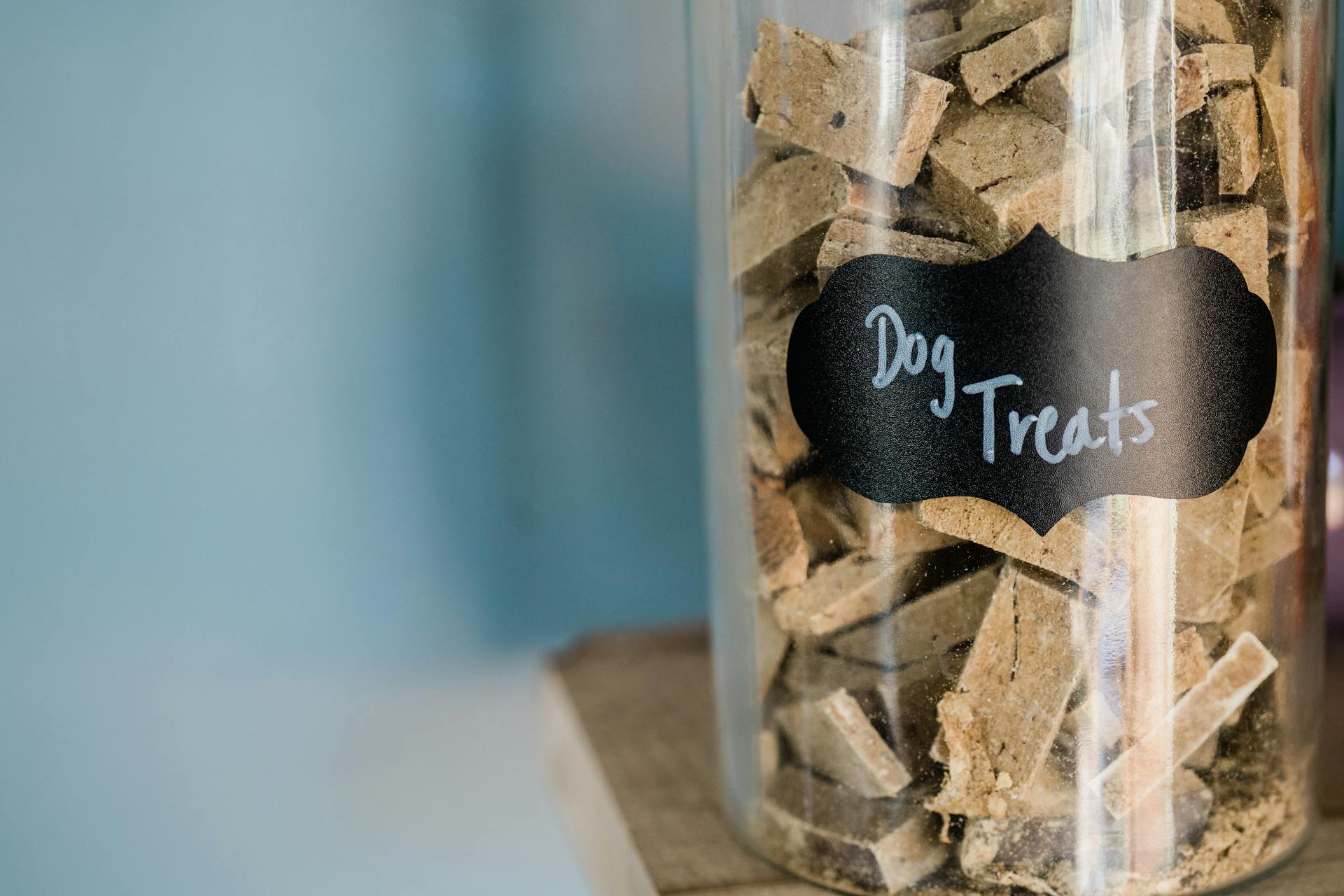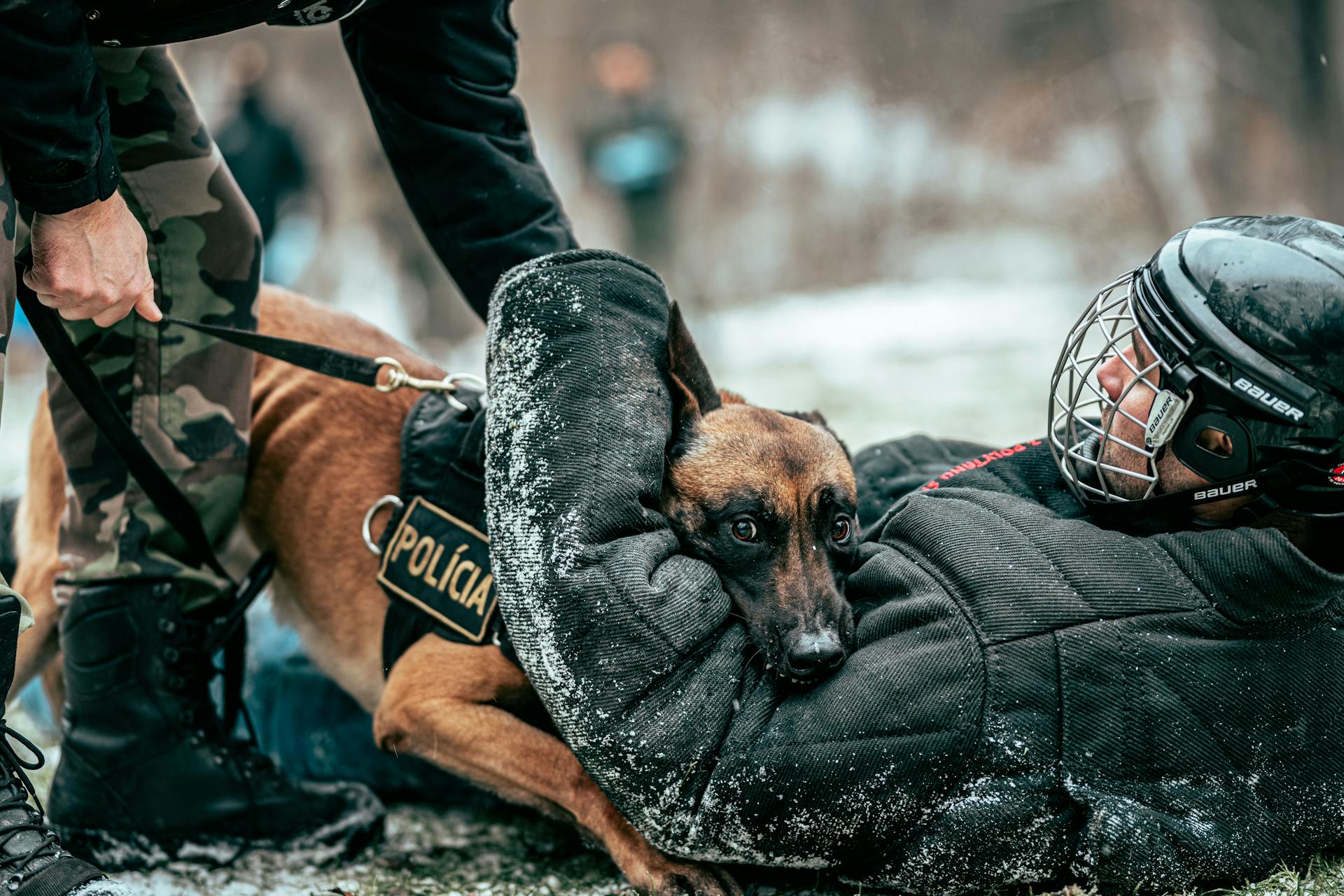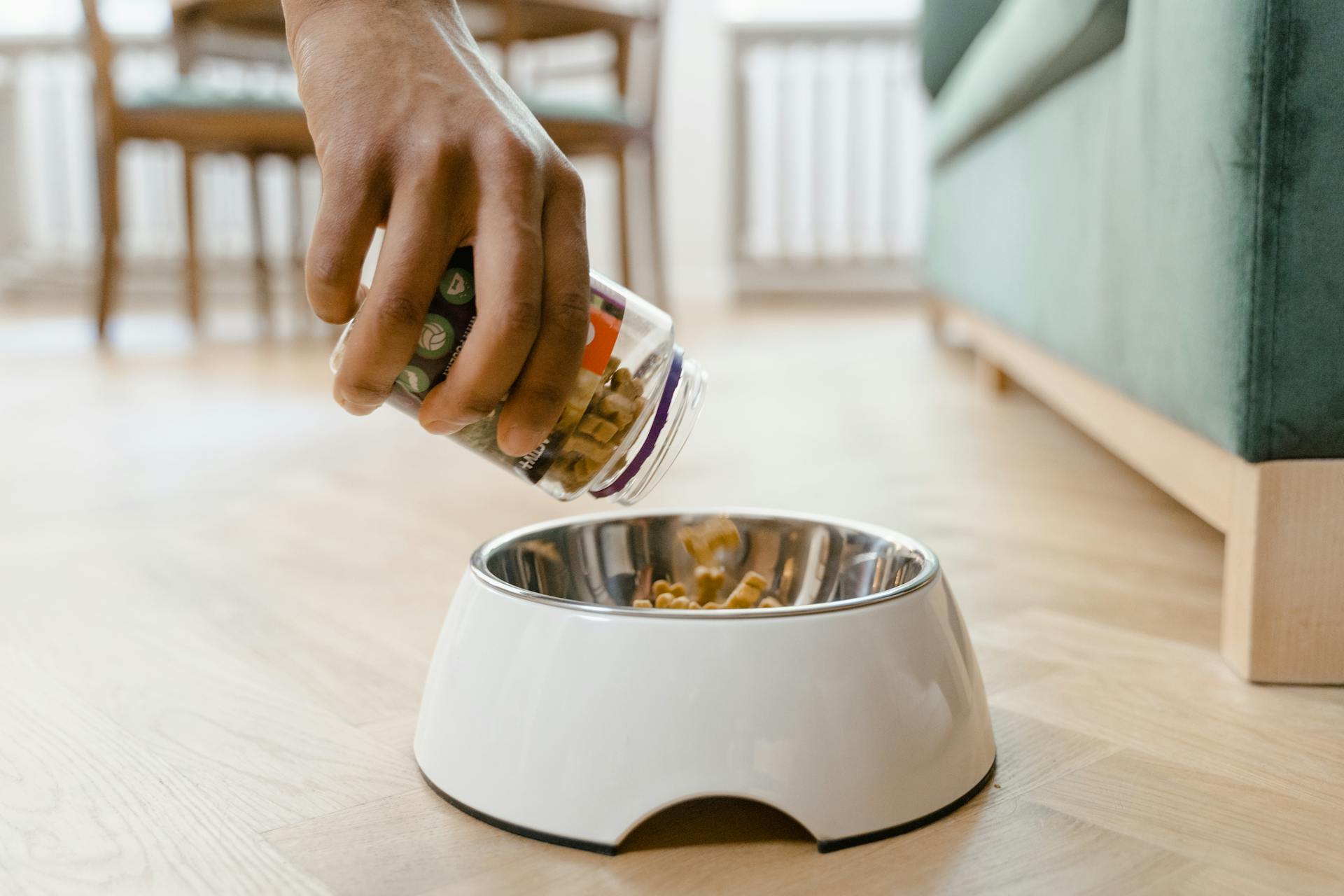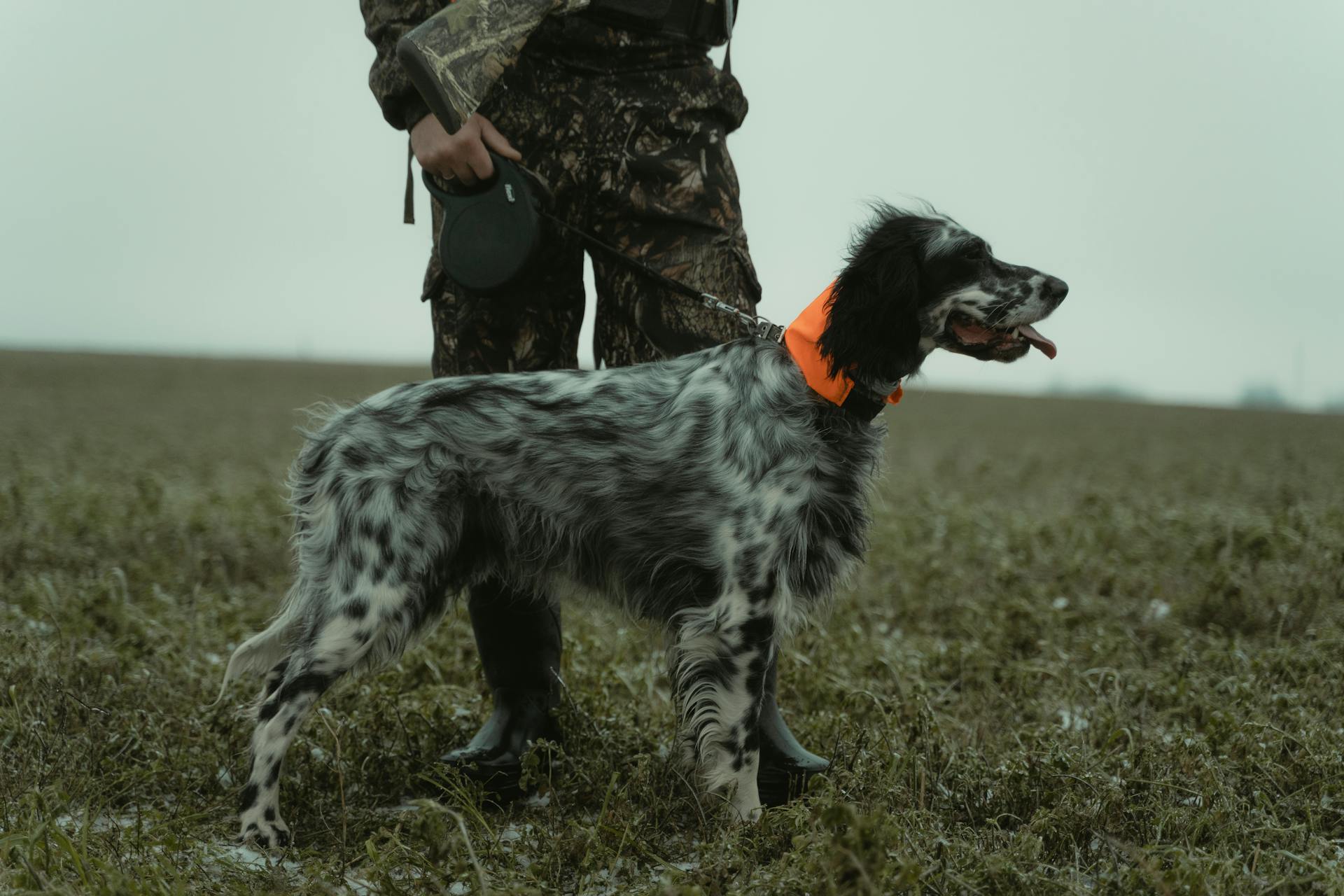
As a working dog owner, you want to ensure your furry companion is fueled for their demanding job. Working dogs require a specific type of nutrition that meets their high energy needs.
A well-balanced diet is essential for a working dog's performance and overall health. According to research, a working dog's diet should provide 25-30% more calories than a non-working dog's diet.
Working dogs need a diet rich in protein to maintain their muscle mass and support their high energy levels. A study found that working dogs require a minimum of 22% protein in their diet.
A good food for working dogs should also contain healthy fats and complex carbohydrates to provide sustained energy.
Choosing the Right Food
Choosing the right food for your working dog is crucial for their overall health and performance. High-protein dog food is a good starting point, as it supports muscle maintenance and energy levels.
Many working dogs benefit from high-protein dog food, with animal-based protein sources such as chicken, beef, or fish being recommended. Look for products with protein content around 20-30%.
Fat is also essential for working dogs, providing concentrated energy and maintaining a healthy coat and skin. A diet with 15-20% fat content is suitable.
A balanced diet should also include some carbohydrates for sustained energy. However, it's essential to adjust the portion size and calorie content to match your dog's energy expenditure.
Some working dogs may benefit from specialized diets, such as sled dog food or police dog food, which are formulated to meet their unique nutritional needs. Consult with a veterinarian to determine the specific nutritional requirements of your working dog.
To ensure your working dog gets the right amount of food, start by following the recommended amount on the dog food label. You can then adjust the amount based on your dog's individual metabolism and exercise level.
Here are some general guidelines for feeding working dogs:
Remember to encourage hydration by making water available and encouraging your working dog to take water breaks.
If this caught your attention, see: Boiled Chicken Water for Dogs
Feeding Frequency and Amount
Feeding your working dog the right amount of food at the right time is crucial to their performance and overall health. To determine the ideal feeding frequency, consider dividing their daily calorie needs into smaller, more frequent meals.
A good rule of thumb is to feed working dogs smaller meals throughout the day, especially during extended periods of activity. This can help maintain their energy levels and prevent digestive issues.
Here's a rough guide to help you estimate the daily feeding frequency for your working dog:
Remember, every dog is different, and their nutritional needs will vary depending on their breed, age, and activity level. Consult with a veterinarian to determine the specific feeding schedule and amount that's right for your working dog.
Pet Feeding Frequency
A working dog should eat at least twice a day, but timing is everything. It's best to feed them 1-3 hours before or after exercise to avoid digestive issues.
Feeding your dog too soon before or after exercise can lead to a bloated or 'twisted' stomach, diarrhea, or other digestive issues. This can be a real problem for both you and your pup.
Just like us, spoiling their meals with high-sugar snacks or treats will hinder their performance when exercising. It's best to keep these indulgences to a minimum.
Indulging your working dog with treats or table scraps should be done only on occasion, so they'll stay healthy, strong, and lean.
Intriguing read: Types of Dog Treats
How Much Food Should I Feed My Pet?
Feeding your pet the right amount of food is crucial for their overall health and well-being. A working dog tends to eat around 1.5 to 2.5 times the amount of food that a regular dog eats, depending on their activity level.
To determine the right amount of food for your pet, consider their breed and size. Larger breeds typically require more calories than smaller breeds. For example, a working Malamute or Labrador Retriever may need more calories than a Border Collie.
Puppies and younger dogs may require more calories for growth and development, while senior dogs may need fewer calories. The type and intensity of the work the dog is performing significantly impacts their calorie needs. Dogs involved in strenuous tasks like pulling sleds or performing search and rescue missions may require significantly more calories than dogs with more moderate activity levels.
As a general guideline, a moderately active working dog may require around 30 to 70 calories per pound of body weight per day. However, this can vary widely, so professional guidance is crucial.
Here are some key factors to consider when determining the right amount of food for your pet:
- Protein: Working dogs require higher levels of protein to support muscle maintenance and repair. Aim for a diet with around 20-30% protein content.
- Fat: Fat is a concentrated source of energy and is crucial for working dogs. A diet with around 15-20% fat content is suitable.
- Carbohydrates: Carbohydrates provide additional energy. While dogs can thrive on a diet with fewer carbohydrates, including some is important to ensure sustained energy for physical activities.
- Calorie intake: Adjust the portion size and calorie content of their food to match their energy expenditure.
- Hydration: Adequate water intake is essential, especially for active dogs. Ensure that they have access to fresh, clean water at all times.
Remember to consult with a veterinarian to determine the specific nutritional requirements of your working dog, as these needs can vary based on the dog's breed, age, and activity level.
Nutrition and Diet
Diet for working dogs is essential to ensure they have the energy and nutrients needed to perform at their best. They have higher energy requirements than the average pet due to their physical activity and work demands.
Here's an interesting read: Dog Food for High Energy Dogs
Protein is a key ingredient for working dogs, providing the building blocks of new muscle tissue, which is vital for recovery and endurance. Amino acids make up the structure of protein and can't be produced by the body on its own, so must be sourced through a healthy, protein-rich diet.
A working dog's calorie needs can vary widely based on factors like breed, size, age, activity level, and the type of work they're engaged in. Dogs involved in physically demanding tasks typically require more calories than sedentary pets.
Here's a breakdown of the factors to consider when determining the calorie intake for your working dog:
- Breed and Size: Larger breeds require more calories than smaller breeds.
- Age: Puppies and younger dogs may require more calories for growth and development.
- Activity Level: The type and intensity of the work the dog is performing significantly impact their calorie needs.
- Weight Management: Monitor your dog's weight to ensure they're not gaining or losing weight inappropriately.
- Climate: Dogs working in cold weather may need more calories to maintain body temperature.
As a general guideline, a moderately active working dog may require around 30 to 70 calories per pound of body weight per day.
A unique perspective: How Many Treats Should I Give My Dog a Day
High Protein Diet?
A high protein diet is essential for working dogs, especially those that spend their days running, jumping, and problem-solving.
Protein is a key ingredient for these dogs, and its rich BCAA content - branched-chain amino acids - is crucial for muscle recovery and endurance.
Amino acids make up the building blocks of protein and form the structure of new muscle tissue, which is vital for all dogs, but especially highly active ones.
Importantly, amino acids can't be produced by the body on its own, so must be sourced through a healthy, protein-rich diet.
Here's an interesting read: Is High Protein Dog Food Good for Dogs
Insight into Nutrition

Working dogs have higher energy requirements than average pets due to their physical activity and the demands of their work.
Their diet should provide the necessary energy, nutrients, and overall health to perform at their best.
Diets for working dogs are essential to ensure they have the energy and nutrients needed to perform at their best.
Glucosamine is an ideal supplement for hard-working dogs whose joints and bones need to be at their strongest.
It's vital in forming connective tissue in and around the joints and protecting them from wear and tear as well as the ageing process.
The best joint and bone supplements for dogs contain glucosamine alongside other key ingredients such as chondroitin and collagen.
Omega-3 supports cardiovascular and brain health and reduces post-run inflammation, which in turn can ease muscle pain and encourage tissue repair.
Oily fish such as salmon is an excellent source of omega-3 fatty acids, but an easily drizzled liquid form such as salmon oil is a great alternative if you struggle to incorporate this into your dog's meals.
Working dogs need to recover and regenerate after strenuous activity, and adding some choice ingredients to their meals can give them the best chance of performing at their best without burnout or injury.
Intriguing read: What Food Is Good for Dogs Joints
Dog Calorie Needs
A working dog's calorie needs vary widely depending on several factors, including their breed, size, age, activity level, and the specific type of work they're engaged in.
For example, larger breeds like Malamutes and Labradors may require more calories than smaller breeds like Border Collies.
The type and intensity of the work the dog is performing also significantly impact their calorie needs, with dogs involved in strenuous tasks like pulling sleds or performing search and rescue missions requiring more calories.
A general guideline is that a moderately active working dog may require around 30 to 70 calories per pound of body weight per day.
However, this can vary widely, so it's essential to consult with a veterinarian or a veterinary nutritionist to determine the exact calorie requirements for your working dog.
To determine the appropriate calorie intake for your working dog, consider the following factors:
- Breed and Size: Larger breeds typically require more calories than smaller breeds.
- Age: Puppies and younger dogs may require more calories for growth and development, while senior dogs may need fewer calories.
- Activity Level: The type and intensity of the work the dog is performing significantly impact their calorie needs.
- Weight Management: It's essential to monitor your dog's weight to ensure they are not gaining or losing weight inappropriately.
- Climate: Dogs working in cold weather may need more calories to maintain body temperature, while those working in hot weather may need more hydration and slightly fewer calories.
Remember, providing a balanced diet that meets your dog's energy and nutritional needs is crucial to ensure they can perform their tasks effectively and maintain their health.
Dietary Restrictions and Considerations
When feeding working dogs, it's essential to consider their dietary restrictions and needs. Working dogs require a high-calorie diet to maintain their energy levels.
Dogs with food sensitivities may benefit from a limited-ingredient diet. This can help identify any potential allergens.
Working dogs with certain health conditions, such as allergies or digestive issues, may require a specific type of food. For example, dogs with food allergies may need a novel protein source, such as venison or duck.
A well-balanced diet is crucial for maintaining a working dog's overall health and performance.
Explore further: What Do Food Allergies Look like in Dogs
Can I Eat Normal Food?
You can eat regular dog food without being harmed, especially if the food is of high quality and made with whole food sources.
However, a working dog expends vast amounts of calories per day.
Regular dog food may not provide the optimal calorie and fat content needed to sustain them.
It would be of most benefit to feed them a diet that’s been designed specifically for working dogs.
Do Animals Need Strict Diets?

Working dogs have higher energy requirements due to their physical activity and demanding jobs, necessitating a more calorie-dense and protein-rich diet.
While working dogs often need a balanced diet, the type of work they perform can influence their dietary needs. For example, sled dogs require a diet tailored to meet their unique energy and nutrient demands.
Adequate hydration is vital for working dogs, as they can lose a significant amount of water during their activities. Ensure they have access to fresh water at all times.
Working dogs often need a balanced diet that provides the right proportions of protein, fats, and carbohydrates, as well as essential vitamins and minerals. The balance may need to be adjusted to support their specific activities.
Regular monitoring of a working dog's body condition is crucial. If they are gaining or losing weight inappropriately, adjustments to their diet may be necessary to maintain a healthy weight.
Consulting with a veterinarian or a veterinary nutritionist is the best way to create a dietary plan that meets the individual needs of your working dog.
Discover more: Homemade Weight Loss Food for Dogs
Food Selection and Ingredients
When selecting food for your working dog, consider their specific needs and choose high-quality brands known for their nutritional value and safety. Tailoring the diet to your dog's individual requirements is essential for their overall health and performance.
High-protein dog food is a great starting point for working dogs, as it supports muscle maintenance and energy levels. Look for products with animal-based protein sources such as chicken, beef, or fish.
Working dogs require a diet rich in protein and fat to provide sustainable energy. A prey model diet or grass-fed meats can be ideal for working/performance dogs that need more calories to keep on weight.
Here are some key ingredients to look for in your working dog's food:
- Real animal protein as the first ingredient (such as Turkey, Pork, or Beef)
- Glucosamine and chondroitin to support healthy joints
- No artificial flavors, colors, sweeteners, or other additives
What to Look for on Ingredients & Guaranteed Analysis Panels
When selecting a food for your working dog, it's essential to read the ingredients panel carefully. Look for real animal protein as the first ingredient, such as Turkey, Pork, or Beef.
Not all proteins are created equal, and ingredients like "meat meal" are not ideal. Dog food with corn, grains, or soy protein as the first ingredient is unlikely to provide the necessary nutritional profile for your working dog.
A high protein diet is crucial for building and maintaining strong, healthy muscles. Working dogs need a diet that provides them with sustainable energy, and a relatively high fat content is essential.
If you're considering a raw diet, a prey model is a great option. It's higher in protein and fat, making it ideal for working/performance dogs that need extra calories to maintain their weight.
Dogs eating grass-fed and grass-finished meats, like in Steve's Real Food, will benefit from natural contents of Omega 3 & Omega 6 fatty acids.
Working dog food should support healthy joints, as their work can be tough on their joints. Look for ingredients that contain glucosamine and chondroitin, like Eggshell Membrane, which promote healthy joint function.
Lastly, avoid dog foods with artificial flavors, colors, sweeteners, or other additives. These substances don't provide any added benefits and may even harm your pet's health.
Here are the key things to look for on the ingredients panel:
- Real animal protein as the first ingredient (e.g. Turkey, Pork, or Beef)
- A relatively high fat content for sustainable energy
- Glucosamine and chondroitin for healthy joints (e.g. Eggshell Membrane)
- No artificial flavors, colors, sweeteners, or other additives
Fresh Ingredients Make All the Difference

Fresh ingredients are the key to a healthy and balanced diet for your dog. This is especially true when it comes to choosing the best dog food.
Using fresh, raw ingredients in dog food can make all the difference in your dog's health and well-being. Fresh ingredients are more easily digestible than processed ones, which can lead to fewer stomach problems and allergies.
Raw ingredients are also more nutrient-dense, meaning they provide more nutritional value per bite. This is because fresh ingredients haven't been stripped of their natural goodness through processing.
Processed dog foods often contain fillers and by-products that can be difficult for dogs to digest. These ingredients can cause a range of health problems, from digestive issues to skin allergies.
Choosing a dog food that uses fresh, raw ingredients can be a game-changer for your furry friend. You'll be giving them the best chance at a happy, healthy life.
Intriguing read: Dog Health Food
DOs and DON'Ts of Feeding
Feeding your working dog requires careful consideration of their unique nutritional needs. Make sure to provide a diet rich in protein, with a content of around 20-30% to support muscle maintenance and repair.
It's essential to encourage hydration by making water available and encouraging your working dog to take water breaks. Water is the most important element in any working dog's diet, and avoiding dehydration is key.
Feeding your working dog too much too quickly can lead to digestive upset. Gradually increase their food supply by no more than 20% a day until you've reached an amount that allows them to maintain a healthy weight and energy level.
Start by following the label recommendations on your dog food, but be aware that your working dog will likely need more than the recommended amount. A dog at an ideal weight will have a waist when viewed from above, and you should be able to easily feel their ribs when lightly running your hands across their sides.
Intriguing read: What Can You Feed Dogs Instead of Dog Food
Avoid feeding your dog immediately before or after strenuous exercise, as this can cause digestive upset or discomfort. It's best to put off their meal until they've cooled down a bit.
Here are some key DOs and DON'Ts to keep in mind:
- DO: Encourage Hydration
- DON'T: Make Sudden Changes
- DO: Begin with Label Recommendations
- DON'T: Feed Your Dog Immediately Before or After Strenuous Exercise
Specific Food Products
When selecting food products for your working dog, consider their specific needs, consult with a veterinarian or a veterinary nutritionist, and choose high-quality brands known for their nutritional value and safety. Tailoring the diet to your dog's individual requirements is essential for their overall health and performance.
High-protein dog food can be beneficial for working dogs, especially those with high energy levels. Look for products with animal-based protein sources such as chicken, beef, or fish.
Performance dog food is specifically designed for active dogs, including working dogs. These formulas are usually rich in protein and contain the necessary nutrients for sustained energy.
Some working dogs do well on grain-free diets, which are often based on animal proteins and may be suitable for dogs with grain sensitivities.
If this caught your attention, see: Do Dogs Need Grains in Their Food
Top 10 Food Products

If you're looking for top-notch food products for your working dog, there are several options to consider. High-Protein Dog Food is a great choice, as it supports muscle maintenance and energy levels with animal-based protein sources like chicken, beef, or fish.
For active dogs, Performance Dog Food is a good option, providing sustained energy with a rich protein content. It's specifically designed for dogs like yours who are always on the go.
Grain-Free Dog Food is another option, often based on animal proteins and suitable for dogs with grain sensitivities. Some owners have found it helps their working dogs feel their best.
Raw Food, such as the Biologically Appropriate Raw Food (BARF) or Prey Model diets, can also be a good choice, consisting of raw meat, bones, and other ingredients. Just make sure they're formulated and balanced properly.
For a convenient and balanced option, consider High-quality commercial kibble designed for active dogs. Look for brands with real meat as the primary ingredient.
Related reading: Is Grain Free Food Better for Dogs

Wet Food is another great option, providing moisture and beneficial for dogs working in hot environments. It can be a good addition to kibble or as a stand-alone diet.
Some working dogs may have specific health concerns or dietary needs, in which case a veterinarian may recommend Prescription Diets designed to address these issues. These diets are often tailored to the individual dog's needs.
If you have sled dogs or dogs involved in activities that require long hours of strenuous exercise in cold conditions, Sled Dog Food is worth considering. These diets are formulated to meet the high energy demands of sled dogs.
If you prefer to prepare homemade meals for your working dog, be sure to consult with a veterinary nutritionist to ensure a balanced diet. This will help ensure your dog gets all the necessary nutrients.
Here are the top 10 food products for working dogs:
- High-Protein Dog Food
- Performance Dog Food
- Grain-Free Dog Food
- Raw Food (BARF or Prey Model)
- Kibble
- Wet Food
- Veterinary Prescription Diets
- Sled Dog Food
- Home-Cooked Meals
- Supplements (e.g. fish oil for joint health)
Akela 80:20 Kibble
Akela 80:20 Kibble is a well-balanced food option for your furry friend.
This kibble is formulated to provide 80% animal-derived protein and 20% animal-derived fat, making it a nutrient-rich choice for dogs.
Akela 80:20 Kibble is made with high-quality chicken as the first ingredient, ensuring that your dog gets the essential protein they need.
The kibble is also free from common allergens like beef, dairy, and soy, making it an excellent option for dogs with sensitive stomachs.
As a result, Akela 80:20 Kibble has been shown to improve digestion and reduce shedding in many dog owners' pets.
With its unique 80:20 ratio, Akela 80:20 Kibble is designed to mimic a dog's natural diet, providing a more natural and healthy eating experience.
Discover more: Natural Balance Dog Food Making Dogs Sick
Frequently Asked Questions
What are the nutritional requirements for a working dog?
For optimal performance, a working dog requires a diet with 500-600 calories per cup, 25-35% fat, 30-35% protein, and 30-35% carbohydrates. A balanced diet like this supports a working dog's high energy needs and helps maintain their physical and mental health.
Sources
- https://www.poochandmutt.co.uk/blogs/nutrition/working-dog-feeding-guide
- https://felcana.com/blogs/blog/working-dog-food
- https://www.vet.cornell.edu/departments-centers-and-institutes/riney-canine-health-center/canine-health-information/feeding-your-performance-dog
- https://stevesrealfood.com/2019/02/04/pet-food-working-performance-dogs/
- https://www.wholeprey.com/canine/akela-80-20-dog-food.html
Featured Images: pexels.com


